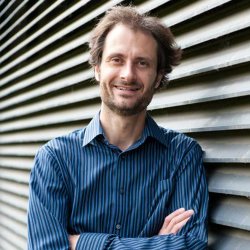Meet the academic: Dr Daniel Whelligan
Lecturer in Organic/Medicinal Chemistry and Programme Leader of our MRes Chemistry, Dr Daniel Whelligan explains what inspired him to teach, and tells us about his fascinating research into DNA repair.
Please could you introduce yourself – perhaps you could tell us something that isn’t on your staff profile page?
I started out as a pure organic chemist but have become quite multidisciplinary in my work on early drug discovery, chemical biology and fuel cell design, which involves a lot of collaboration.
What’s your favourite memory of being a student?
The main thing that stands out is all the friends I made – who I still have today. The interaction with people at the top of their field was also amazing: having supervisions and lectures from people who were carrying out important research and could answer my questions was a fantastic opportunity.
How and why did you become an academic?
I think it was always in the back of my mind that I could teach: as a student I’d look at how a lecturer was tackling a certain topic and think about how I would do it differently. When the opportunity to become a lecturer at Surrey came up, the idea really appealed to me. Up until this role I always carried out research and being an academic lets you do both.
What excites you most about your current role?
One of the best things is the freedom to research anything you want, and to collaborate with other people. On the teaching side I enjoy thinking about the best way to put something across to make students understand. When you see those little eureka moments on the faces in class, that’s a great feeling!
What is your particular area of academic expertise, and why are you passionate about it?
I’ve always been fascinated by organic synthesis – making molecules – which has numerous applications in medicine. My main project at Surrey so far has been around DNA repair and, in particular, slowing down a specific DNA repair enzyme, which could eventually reduce the side effects of chemotherapy or help stroke or organ failure patients. I’m also collaborating with biologists to inhibit the molecule that causes Buruli ulcer (a neglected tropical disease), and – in a completely different area – working on improving membranes used in alkaline fuel cells.
Why should people study at postgraduate level in your academic area?
Our MRes is an exceptional course. It enables you to study whichever area of chemistry you want, and be supervised by an academic who is world renowned in their field of expertise. With the course consisting of three-quarters research and one-quarter taught content, you’ll develop and hone your practical skills by using them every day.
What are you looking for in a postgraduate student?
Someone who is interested and enthusiastic about this area and really wants to solve research problems.
Is there a particular memory of your time at Surrey (so far) which stands out for you?
Putting on sketches at the Christmas ChemSoc Review (organised by the students) with my fellow academics in the Department of Chemistry. The last one we did was based on ‘Games of Thrones’ and was all about academics trying to become the next Head of Department!
